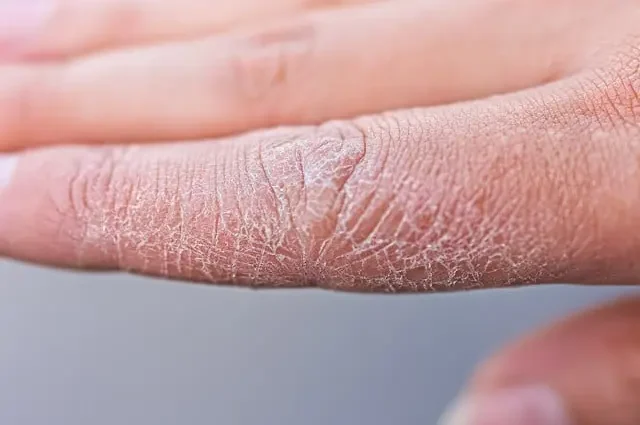Contents
Are you familiar with such a problem as dryness and flaking of the skin, and are you sure that peeling will only aggravate the unpleasant condition? Then this article is for you. We tell you what miracles skin exfoliation is capable of and why this procedure should not be ignored.
What you need to know about peeling for dry skin
Not all methods are good for peeling dry skin. Typically, dry skin is characterized by:
thin epidermis;
uneven color;
small wrinkles.
Peeling helps not only to minimize the visibility of defects, but also to prevent their occurrence.
Take our test and find out what cosmetics you need right now.
How does work
The purpose of peeling is to improve the appearance of the skin by removing dead particles from its surface and stimulating cell renewal.
When to apply
Reasons for peeling for dry skin are:
uneven skin tone;
severe dryness, peeling;
network of wrinkles caused by dehydration and dryness.
Efficiency
After a course of procedures, positive changes are obvious.
Improves skin texture.
Acne marks are reduced.
The pigmentation becomes less pronounced.
The skin looks fresher, rejuvenated and hydrated.
Dryness and flaking disappear.
What are the methods of peeling
After any peeling, the skin literally “cheers up” and looks better.
According to the method of exposure, there are several types of peeling:
chemical – produced using acids: glycolic, lactic, mandelic;
enzymatic or enzymatic – enzymes or enzymes are used (bromelain, lipase, etc.);
mechanical – brushing, scrub, dermabrasion;
laser;
physical – using liquid nitrogen or dry ice;
ultrasonic – exfoliating action produces an ultrasonic wave.
Features of chemical peeling in the salon
Chemical peels are based on various acids. Depending on their concentration, the depth of exposure to the skin is determined. Thus, there are several types of chemical peels.
Superficial peeling
Exposure of the skin to chemical agents occurs at the level of the stratum corneum of the skin. Usually the active ingredient is fruit acids.
Median peeling
The action of such peeling reaches the capillary dermis. The active ingredients are trichloroacetic acid, azelaic or salicylic acid. A rather aggressive type of effect on the skin, but effective. The quality of the skin is greatly improved.
Deep peeling
One of the most serious types of peeling, when chemical agents affect the reticular dermis. For such peeling, phenol is used. Experts believe that this is one of the few procedures that can rejuvenate the skin, but it has a very long list of contraindications.
Peeling at home
Let’s make a reservation right away that only superficial mechanical and chemical peels are carried out at home. The best time for the procedure is evening. For this, different cosmetics are used:
cleansing masks;
exfoliating creams;
scrubs;
peelings in the form of lotions and serums.
Preparing for the procedure
Before you start peeling, you must thoroughly cleanse your face of makeup. After washing, the skin is toned with lotion or tonic.
Peeling
Apply a peeling agent to a cleansed face – gommage, peeling roll, scrub or exfoliating mask. Let it work on the skin for a few minutes.
Post-procedure care
Rinse the peel off the skin thoroughly. Use lotion or tonic. Apply your usual night care products – a cream or a nightly leave-in mask.
Often, home peels are night serums and concentrates with a low acid content for a gradual and gentle renewal of the skin. Naturally, such funds do not need to be washed off. They are used before bedtime instead of night care or before night cream. Read the instructions carefully.
Should I do a peeling for dry skin in the salon?
Salon peeling is carried out in courses. At home, you can repeat the procedure 1-2 times a week.
If we talk about the peeling procedure, then the ideal option for dry skin would be a combination of home and salon care. For an effective and noticeable result, we advise you, together with a cosmetologist, to choose the optimal program, which will include both professional and home remedies.
Tips and reviews of cosmetologists
Ekaterina Turubara, Vichy medical expert, gives a number of tips for exfoliating dry skin.
With dry and dehydrated skin, the course is selected individually: usually the peeling solution is softer, and 2-3 procedures are enough.
To keep the skin in good condition, peeling courses will have to be repeated: on average – 1-2 times a year (with breaks for periods of high insolation in spring and summer, as well as the time of bitter frosts in winter).
Between procedures, you should follow the recommendations of a specialist, and usually the first and most important advice is to thoroughly moisturize the skin and protect it from ultraviolet radiation.
Overview of peeling products
Moisturizing renewing serum Retexturing Activator, SkinCeuticals
Smoothes the skin, starting the process of cell exfoliation, thanks to a complex of acids, kombucha extract and hydroxyethyl urea.
Nightly Refining Micro-Peel Concentrate, Kiehl’s
The blend of fruit acids, phytic acid and quinoa extract in the Night Peel helps to even out the complexion and start the skin’s natural renewal process.
Soft scrub, La Roche-Posay
Delicately exfoliates the skin without damaging it. Suitable even for sensitive skin.
Exfoliating cleansing gel for daily use Biosource, Biotherm
The Biosource Facial Cleansing Gel gently exfoliates dead skin cells, leaving all skin types looking fresh.
Mineral peeling mask “Double Radiance”, Vichy
Fruit acids and volcanic particles gently exfoliate and even out the surface of the skin, improving the complexion.










